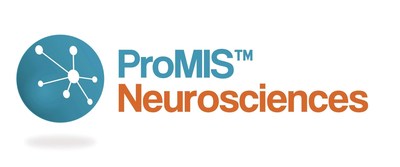ProMIS Neurosciences Identifies Novel Antibodies for Alzheimer's Disease with Selectivity for the Neurotoxic Form of Tau
Pipeline offers critical "one-two punch" in potential treatment
arsenal for Alzheimer's disease
TORONTO and CAMBRIDGE, MA, May 28, 2019 /CNW/ - ProMIS Neurosciences, Inc. (TSX: PMN) (OTCQB: ARFXF), a biotechnology company focused on the discovery and development of antibody therapeutics targeting toxic oligomers implicated in the development of neurodegenerative diseases, has identified several promising novel antibody candidates that selectively bind the toxic form of Tau.

The misfolded, toxic form of Tau, an otherwise normal protein in the brain, is implicated in the development of Alzheimer's disease along with the toxic oligomer of amyloid beta. Dual targeting of toxic forms of Tau and amyloid beta is currently one of the most promising areas of therapy development in Alzheimer's disease. ProMIS Neurosciences now has two potential therapy candidates that address both neurotoxic proteins.
ProMIS leveraged its proprietary drug discovery and development platform to identify several novel antibodies that selectively bind toxic oligomers of Tau. The platform produces antibodies that meet a key success factor for a viable Alzheimer's disease therapy: the ability to selectively target the neurotoxic form of a protein, while sparing the normal forms of the protein, a challenge that has contributed to recent late-stage clinical trial failures. The platform not only generates high-quality antibody candidates, it delivers powerful, validated candidates in months versus years. Used in combination with new biomarkers for Alzheimer's disease, researchers could dramatically improve the success and speed of future therapy development efforts.
"The ProMIS platform addresses a problem that has plagued the Alzheimer's drug development community: the inability to selectively target the neurotoxic form of Tau and amyloid beta," said Dr. Neil Cashman, a renowned researcher in protein misfolding diseases and Chief Science Officer of ProMIS Neurosciences. "A recently published scientific study from the team led by Nobel Laureate Stanley B. Prusiner M.D., shows that Alzheimer's disease is a double prion disorder1, 2, resulting from self-propagating amyloid and Tau prions. We're proud that our pipeline may offer the critical one-two punch to neutralize both of these toxic oligomers and offer potential disease-modifying therapy that this patient community so desperately needs and deserves."
ProMIS' novel Tau antibodies join a pipeline of antibody candidates that demonstrate selectivity for the toxic species of naturally occurring proteins in the brain. The pipeline includes:
- Alzheimer's disease:
- PMN310, an antibody clinical candidate that selectively targets the toxic form of amyloid beta
- Novel Tau antibodies that are potential candidates selectively targeting the toxic form of Tau.
- Parkinson's disease
- Antibody candidates showing best-in-class selectivity for toxic forms of alpha synuclein compared to other therapeutic antibodies in development.
- ALS (amyotrophic lateral sclerosis)
- Antibody candidates targeting the toxic form of TDP43.
To learn more about Tau, Alzheimer's and Parkinson's disease therapy development efforts and the promise of new biomarkers, listen to the podcast, Saving Minds, at iTunes or Spotify.
About ProMIS Neurosciences
ProMIS Neurosciences, Inc. is a development stage biotechnology company focused on discovering and developing antibody therapeutics selectively targeting toxic oligomers implicated in the development and progression of neurodegenerative diseases, in particular Alzheimer's disease (AD), amyotrophic lateral sclerosis (ALS) and Parkinson's disease (PD). The Company's proprietary target discovery platform is based on the use of two complementary thermodynamic, computational discovery engines -ProMIS and Collective Coordinates – to predict novel targets known as Disease Specific Epitopes on the molecular surface of misfolded proteins. Using this unique precision approach, the Company is developing novel antibody therapeutics for AD, ALS and PD. ProMIS is headquartered in Toronto, Ontario, with offices in Cambridge, Massachusetts. ProMIS is listed on the Toronto Stock Exchange under the symbol PMN, and on the OTCQB Venture Market under the symbol ARFXF.
Visit us at www.promisneurosciences.com, follow us on Twitter and LinkedIn
References
1 Science Translational Medicine 01 May 2019: Vol. 11, Issue 490
2 https://www.ucsf.edu/news/2019/05/414326/alzheimers-disease-double-prion-disorder-study-shows
The TSX has not reviewed and does not accept responsibility for the adequacy or accuracy of this release. This information release contains certain forward-looking information. Such information involves known and unknown risks, uncertainties and other factors that may cause actual results, performance or achievements to be materially different from those implied by statements herein, and therefore these statements should not be read as guarantees of future performance or results. All forward-looking statements are based on the Company's current beliefs as well as assumptions made by and information currently available to it as well as other factors. Readers are cautioned not to place undue reliance on these forward-looking statements, which speak only as of the date of this press release. Due to risks and uncertainties, including the risks and uncertainties identified by the Company in its public securities filings, actual events may differ materially from current expectations. The Company disclaims any intention or obligation to update or revise any forward-looking statements, whether as a result of new information, future events or otherwise.
![]() View original content to download multimedia:http://www.prnewswire.com/news-releases/promis-neurosciences-identifies-novel-antibodies-for-alzheimers-disease-with-selectivity-for-the-neurotoxic-form-of-tau-300857076.html
View original content to download multimedia:http://www.prnewswire.com/news-releases/promis-neurosciences-identifies-novel-antibodies-for-alzheimers-disease-with-selectivity-for-the-neurotoxic-form-of-tau-300857076.html
SOURCE ProMIS Neurosciences Inc.
Released May 28, 2019